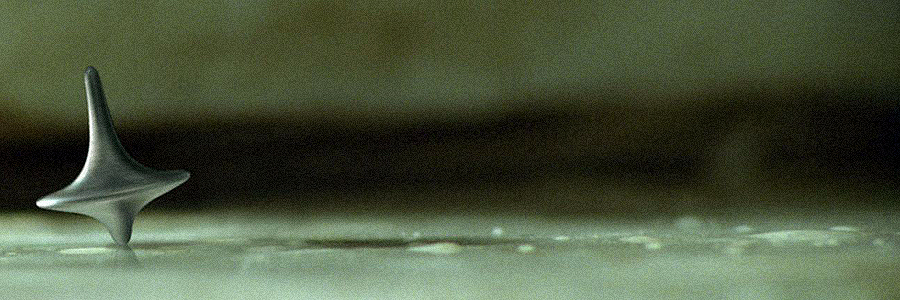
Inception
Warner Bros.
Original release: July 16th, 2010
Running time: 148 minutes
Writer and director: Christopher Nolan
Composer: Hans Zimmer
Cast: Leonardo DiCaprio, Ken Watanabe, Joseph Gordon-Levitt, Marion Cotillard, Ellen Page, Tom Hardy, Cillian Murphy, Tom Berenger, Michael Caine, Lukas Haas
The spinning top
Deconstructing Cinema: One Scene At A Time, the complete series so far
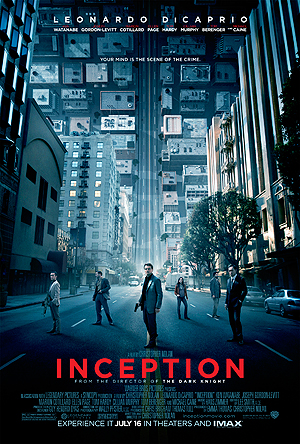
“When I consider this carefully, I find not a single property which with certainty separates the waking state from the dream. How can you be certain that your whole life is not a dream?” ~ René Descartes
For as long as I can remember I’ve always been fascinated by dreams. In them I can fly high above rooftops and glide over oceans, as well as see and talk to loved ones who are no longer here with me. Just last night I dreamt of my father’s smile. In my dreams I know these are just dreams; I know I’m not really flying and I know my father’s dead. Dreams can be powerful things and waking from them can be saddening, or even, sometimes, a relief. Yet for all their wonder and might, only a handful of films have really captured their power. Christopher Nolan’s Inception is among those films.
Together with its impressive special effects by Double Negative and inspiring score by Hans Zimmer, Inception is a film with layers upon layers, taking us deeper and deeper into dreams within dreams. However, its story can be broken down to a simple idea that, once planted in someone’s mind, holds the power to destroy everything from a way of life, to an empire.
Inception opens not with a stunning visual, but with a thundering sound, announcing its arrival before we see Dom Cobb, The Extractor (Leonardo DiCaprio) washed up on the sandy shores, looking as if he’s just come from the Titanic. He’s then taken to Saito, The Tourist (Ken Watanabe); a man in his later years. The two men seem to know each other although Saito struggles to remember exactly where and when they met. Time seems to have become cloudy.
Saito is actually a very rich and powerful business man who wants to make his own empire the world’s next superpower. Obviously, he’s not the only one. His rival is on his deathbed and his son, Robert Fischer, Jr. (Cillian Murphy), is set to inherit everything. Saito uses the opportunity and employs Dom to help him destroy the other empire through the mind of its heir. And Dom seems to be the right man for the job, as his speciality is using dream-sharing technology to extract ideas and information from other people’s minds while they’re asleep.
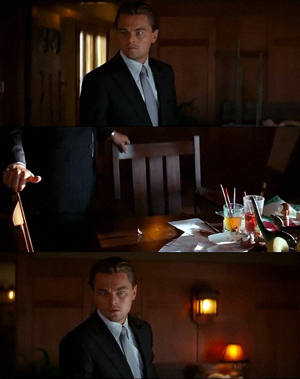
However, Saito doesn’t want Dom to extract anything, he wants him to plant an idea, and this idea simply is that the heir to be will destroy his father’s empire voluntarily. In return, Saito promises Dom to make all his legal problems go away, so he can go back to the United States to be with his children. This then forms the premise of the movie and sets us up for a multilayered story told by Nolan. Dom hires an architect, Ariadne (Ellen Page), whom he needs to construct the landscapes in the dream world, together with Eames, The Forger (Tom Hardy), who can impersonate anyone within a dream, and Yusuf, The Chemist (Dileep Rao), who formulates the drugs that work in the dream world.
They set about to capture Fischer and induce him into a multilayered dream state (a dream within a dream, within a dream) to find out what emotionally motivates him and to plant the seed of the thought which will eventually lead him to destroy his father’s empire.
Inception’s theme of dreams and reality have never been looked at in such a complex visual form before, and takes a moment or two to fully grasp and appreciate when Dom and Ariadne discuss the rules of dreams as they walk through an exploding market street. Eventually, Ariadne forces Dom to deal with the darker aspects of his mind, which will put the whole team in danger as they open up their minds to him in the dreams. Some of the fascinating pieces of dialogue in the film takes place between Arthur, Cobb and Ariadne.
So. A totem. You need something small, potentially heavy…
ARIADNE:
Like a coin?
ARTHUR:
Too common. You need something that has a weight or movement that only you know.
ARIADNE:
What’s yours?
ARTHUR:
A loaded die.
ARTHUR:
I can’t let you handle it. That’s the point. No one else can know the weight or balance of it.
ARIADNE:
Why?
ARTHUR:
So when you examine your totem…
ARTHUR (O.S.):
You know, beyond a doubt, that you’re not in someone else’s dream.
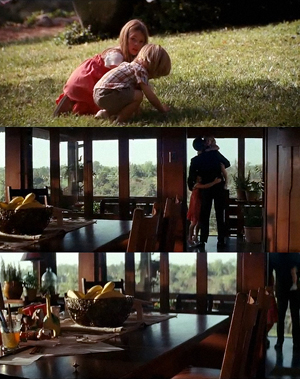
As Ariadne plays with the architecture in her dreams, she creates mind bending spaces and learns to use these skills to build further paradoxes. Cobb’s own crumbling ocean-side city is another marvel, while Arthur moving through a gravity-free hotel certainly has elements of Kubrick’s 2001 A Space Odyssey (1968). The score by Hans Zimmer is masterful and commanding. It moves easily from deep resonating string arrangements in the lower scale to full-on orchestral for more demanding sequences in the film. However, it never overshadows the dialogue or what’s happening on screen.
Nolan had long dreamt of Inception and spent a decade grappling with the idea once it had been planted in his own mind:
When it comes to dream-sharing, a pivotal point in Inception, Nolan went on to say,
As we move towards the climax of the film, rather like waking from a dream itself, I find myself asking not only if it was real, but also how would we know if it wasn’t? The idea of having a totem with you at all times so you’ll know, beyond a doubt, that you’re not in someone else’s dream and that is real, is something that’s revisited in the final scene. And like all great filmmakers before him, Nolan leaves us hanging with possibilities instead of certainties.
By cutting away before we can know for sure if the top falls or continues to spin, Nolan leaves it to us to engage in an endless debate with our peers as to whether or not this happy ending is all but a dream within a dream within a dream. But in doing so, do we miss the point entirely with Inception?
- [1]Inception Production Notes
- [2]Todd McGowan The Fictional Christopher Nolan (2012), University of Texas Press
If we’re missing the point with Inception by questioning the reality of its final scene, then are we also missing the point with our own lives? If we start to question Cobb as a character, as McGowan suggests, then should we also question ourselves? Perhaps we’re all just characters in someone else’s dream, but does this realisation make our experiences any less real?
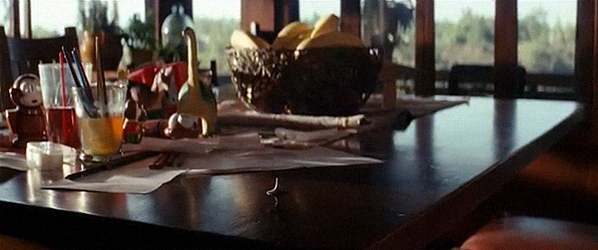

Patrick Samuel
The founder of Static Mass Emporium and one of its Editors in Chief is an emerging artist with a philosophy degree, working primarily with pastels and graphite pencils, but he also enjoys experimenting with water colours, acrylics, glass and oil paints.
Being on the autistic spectrum with Asperger’s Syndrome, he is stimulated by bold, contrasting colours, intricate details, multiple textures, and varying shades of light and dark. Patrick's work extends to sound and video, and when not drawing or painting, he can be found working on projects he shares online with his followers.
Patrick returned to drawing and painting after a prolonged break in December 2016 as part of his daily art therapy, and is now making the transition to being a full-time artist. As a spokesperson for autism awareness, he also gives talks and presentations on the benefits of creative therapy.
Static Mass is where he lives his passion for film and writing about it. A fan of film classics, documentaries and science fiction, Patrick prefers films with an impeccable way of storytelling that reflect on the human condition.
© 2022 STATIC MASS EMPORIUM . All Rights Reserved. Powered by METATEMPUS | creative.timeless.personal. | DISCLAIMER, TERMS & CONDITIONS
HOME | ABOUT | CONTACT | TWITTER | GOOGLE+ | FACEBOOK | TUMBLR | YOUTUBE | RSS FEED
CINEMA REVIEWS | BLU-RAY & DVD | THE EMPORIUM | DOCUMENTARIES | WORLD CINEMA | CULT MOVIES | INDIAN CINEMA | EARLY CINEMA
MOVIE CLASSICS | DECONSTRUCTING CINEMA | SOUNDTRACKS | INTERVIEWS | THE DIRECTOR’S CHAIR | JAPANESE CINEMA





